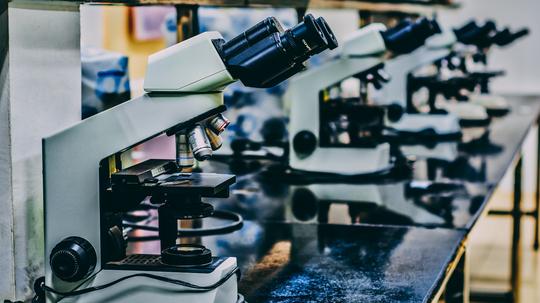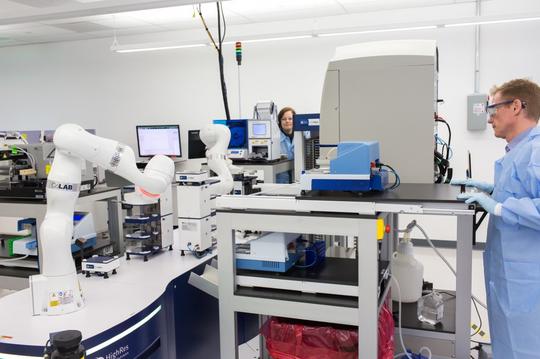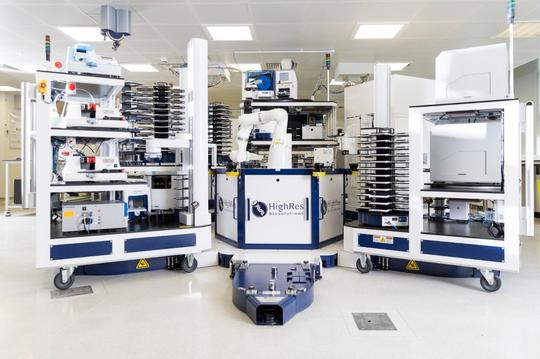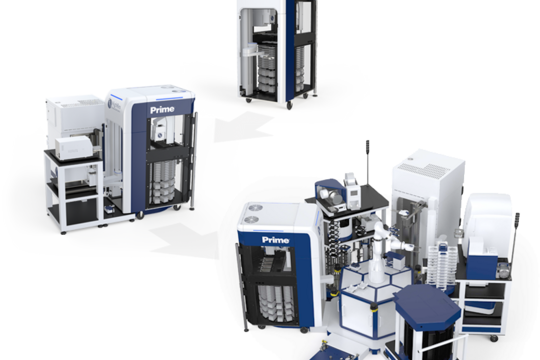
In the labs of big pharma companies like Pfizer, Merck, and AstraZeneca, lab automation is a must. Automation systems are key to reducing staff costs and the margin of human error in experiments.
Beverly-based HighRes Biosolutions is one of the top producers of said automation systems. Counting both multinational pharmaceutical companies (like Pfizer, Merck, AstraZeneca and Recursion Pharma) as well as by up-and-coming companies (like Gingko Bioworks) as its clientele, HighRes Bio has made a big name for itself since its founding in 2004.
“We want to improve human health through life science robotics,” said Ira Hoffman, CEO of HighRes Biosolutions. “We want to give scientists the ability to really focus on science by picking up a lot of their basic collaborative work through automation.”
The company’s products provide a variety of services for labs, whether it's improving communication between a scientist and existing lab equipment or making it simpler to organize and work with liquid samples. Some of HighRes Bio’s products include the CoLAB Flex, a product that is a movable cart to carry individual workstation tools and link them with a central automation system, and the Prime, which stores liquid samples and automatically pipettes them when needed.
When designing automation technology for a lab, each and every project is different. At the start of working with a company, HighRes Biosolutions will conduct a thorough interview to learn its client’s scientific field, its process, and its work style. It then designs a system based on that company’s needs, specializing the software, hardware, and process workflows to that individual company.
“95 percent of the time the resulting system’s as unique as a snowflake,” said Hoffman.
Clients differ in their needs. Larger, older companies have production facilities or factories that have been operating in a particular way for years, and need more static, robust systems. Newer companies that are rapidly evolving, like Ginkgo, prefer to focus on flexibility and portability, as what they do can change on a day-to-day basis. Companies like these prefer automation platforms that are easily movable, with flexible liquid handlers that are customizable and that can work with a variety of different tools.
In fact, HighRes Biosolutions was founded out of a need for this flexibility. The company’s founder, Louis Guarracina, was working in the pharmaceutical production industry, and noticed that lab automation was not as customizable as it should be.
When HighRes Biosolutions was founded, Guarracina and his team created the Microdock, a robotic cart that scientists can use to reconfigure their lab space for their current project. Still in use today, it provides any facilities the instrument on the cart requires, including power and ethernet communication, and its individual components can be easily rearranged for any equipment an instrument may require.
One of the companies’ other successes is that it was one of the first to introduce a collaborative robotic arm to the pharma industry. When HighRes Bio invented its arm, robotic arms in labs posed a danger to scientists. They were large and fast-moving, and required almost constant monitoring. HighRes Bio wanted to solve this problem.
“We invented a platform that lets a human and a robot coexist with no direction from scientists,” said Hoffman. “It essentially lets scientists focus on their science and not have to worry about the complexity of interacting with a large industrial robot.”
HighRes Biosolutions was founded in 2004, and was entirely bootstrapped at its founding. In 2015, equity firm Axel Johnson invested in the company, and it has since become the majority stakeholder. In May, HighRes Bio formed a partnership with TetraScience to pair HighRes Bio’s robotics hardware and software with TetraScience’s Data Integration platform.
In the future, the startup plans on further developing its liquid handler platform Prime, as well as expanding further into software.
“As an integrator, you’re in a really fascinating position; You get to see the design of all these new products, their benefits, their weaknesses,” said Hoffman. “We became real students of the space, and identified many new areas where there was an opportunity for us to make a product.”











